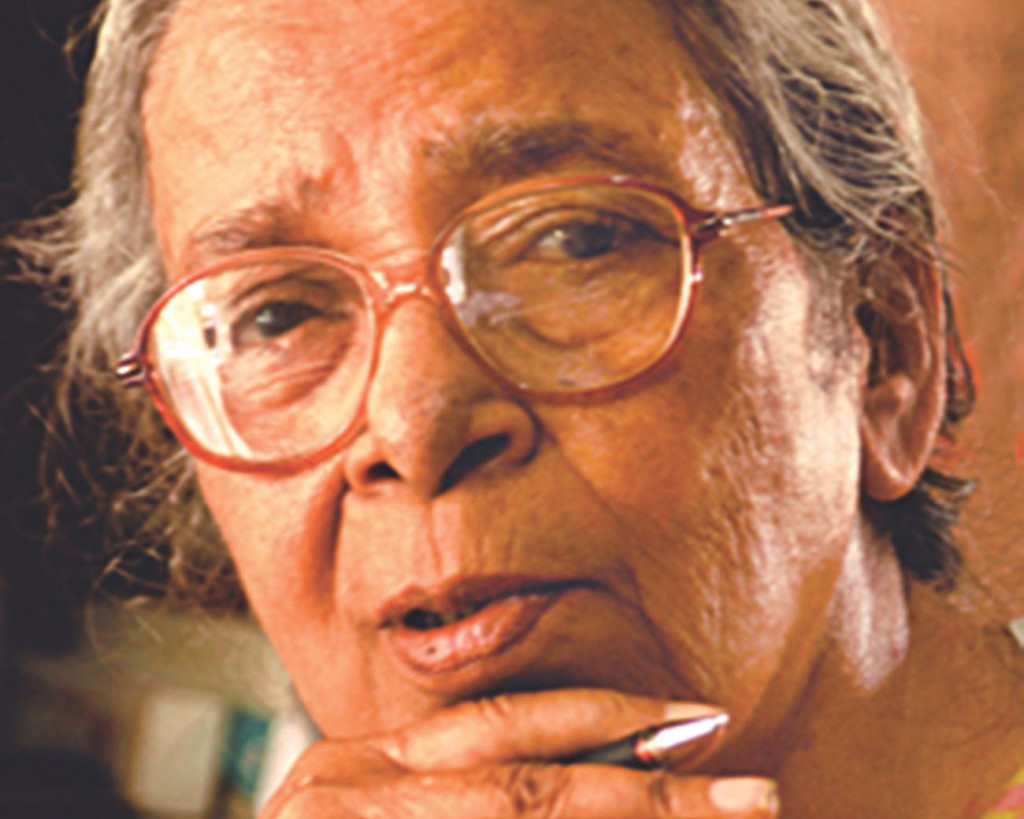【young sex video】
Mahasweta Devi,young sex video 1926–2016
In Memoriam

Mahasweta Devi.
“Please don’t write more books. I can’t read so many books,” a little girl once said to Rabindranath Tagore, the Bengali poet and Nobel laureate. The little girl was Mahasweta Devi, who grew up to be one of India’s best-known writers and activists. When Mahasweta died, on July 28—Devi is an honorific—she left behind no small collection herself: she had written more than a hundred books, including fiction and nonfiction about India’s tribal communities, Maoist insurgents, and women.
Mahasweta died at ninety, and over the course of a long career she became India’s leading writer of fiction in Bengali. She won the Ramon Magsaysay Award—the curiously nicknamed Asian Nobel Prize—in 1997, was shortlisted for the Man Booker Prize in 2009, and counted Gayatri Spivak among her translators. But the admiration of educated elites was of little concern to Mahasweta. Both her fiction and her nonfiction addressed stories of struggle, resistance, and empowerment, a change in focus from the stories about the lives of the urbane middle classes that had previously dominated Bengali literature. She set a powerful example for other Bengali writers, including those who, like Arundhati Roy and Amitav Ghosh, are more familiar to Anglophone readers.
Mahasweta became well known for her sharp satires of gender inequality in India. At the start of “Breast-Giver,” one of her most acclaimed short stories, Yashoda, a Brahmin wet nurse for the family of a patriarch, worries that she exists only in relation to the men in her life. “It’s as if she were Kangalicharan’s wife from birth, the mother of twenty children, living or dead, counted on her fingers,” Mahasweta writes. “Yashoda was a mother by profession, professional mother.” Mahasweta herself was the daughter of a modernist poet, the wife of a street-theater director, and the niece of an arthouse filmmaker, and she tended to speak about about the men in her own life in more ambiguous terms. When asked whether she worried about consequences of her activism, she answered, “I am Ritwik Ghatak’s niece, I am the wife of Bijon Bhattacharya. What should I be scared of? We don’t know what fear is.”
Mother of 1084(Hajar Churashir Ma), which Mahasweta wrote in the seventies—just after the most visible phase of Maoist insurgencies in West Bengal—is perhaps her most widely read work. The novel centers on Sujata, a mother who wakes up one morning to learn that her son Brati is lying dead in a morgue; he is corpse number 1084. Brati was a Maoist, and he owed his death to his often violent revolutionary commitments. Sujata spends most of the novel trying to work out why Brati believed what he did, and why he died as he had.
Mahasweta wrote often about the injustices faced by India’s poor and marginalized, but she was also a more committed psychological writer than her reputation suggests. Though the omniscient narrator of Mother of 1084can feel at times like a self-righteous friend lecturing about the right political line, the book is less a political treatise than a psychological novel about a mother hoping to understand herself and her son. In fact, the real drama of the book is personal: Sujata begins looking for answers in a place that is both geographically and socially distant, a “ramshackle house” where cracking walls are “patched up with cardboard,” and ends up at an old-fashioned two-story building with a porch, a place that is “quite close to her own.” The book ends with Sujata letting out a long cry that “exploded like a massive question.”
During her keynote speech at the 2013 Jaipur Literature Festival, Mahasweta said, “The more I think and write and think some more, the harder it gets to arrive at a definition. I hesitate. I falter.” In her best writing, she captured not only our usual indifference in the face of injustice but the difficulty of precisely articulating what oppression is. That we might not have the right words is the very reason that Mahasweta Devi is still worth reading.
Shivani Radhakrishnan is a Ph.D. candidate in social and political philosophy at Columbia.
Search
Categories
Latest Posts
Great white shark leaps into tiny boat, fisherman treats it like NBD
2025-06-27 03:22MediaTek's real
2025-06-27 02:41Best home security deal: Kasa security cameras are 35% off at Amazon
2025-06-27 02:09Sri Lanka vs. Australia 2025 livestream: Watch 1st ODI for free
2025-06-27 01:08Popular Posts
Miami Heat vs. Brooklyn Nets 2025 livestream: Watch NBA online
2025-06-27 03:30Meet the mayor leaving politics to fight climate change
2025-06-27 02:50To shield it from Trump, climate scientists leaked a major report
2025-06-27 01:57Best external hard drive deal:WD 5TB Elements for $114.99
2025-06-27 01:19Featured Posts
The Year in Tech: 2014 Top Stories
2025-06-27 03:18Looking for a vacation splurge? Consider this space hotel
2025-06-27 03:06Best Presidents' Day deal: Save $44 on Fitbit Charge 6
2025-06-27 02:12Popular Articles
Clean energy projects soared in 2016 as solar and wind got cheaper
2025-06-27 03:09Best speaker deal: Save $80 on the Marshall Stanmore III
2025-06-27 01:46Best speaker deal: Save $80 on the Marshall Stanmore III
2025-06-27 01:42Newsletter
Subscribe to our newsletter for the latest updates.
Comments (488)
Fast Information Network
The Best Sports Video Game of All Time
2025-06-27 02:20Follow Information Network
X launches live video for Spaces
2025-06-27 01:32Heat Information Network
Scientists just fit a GIF onto DNA, which might be the most important thing to ever happen to GIF
2025-06-27 01:23Style Information Network
Disney's 'Iwájú': 5 tech marvels we love
2025-06-27 01:22Ideal Information Network
China just built the world's biggest floating solar project
2025-06-27 01:18